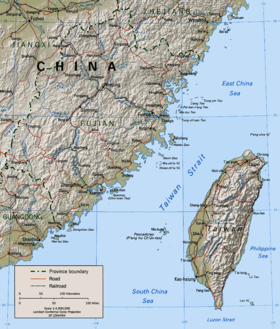First Taiwan Strait Crisis
| First Taiwan Strait Crisis | |||||||
|---|---|---|---|---|---|---|---|
 Taiwan Strait |
|||||||
|
|||||||
| Belligerents | |||||||
|
|
|
||||||
| Commanders and leaders | |||||||
|
|
|
||||||
The First Taiwan Strait Crisis (also called the 1954–1955 Taiwan Strait Crisis, the Formosa Crisis, the Offshore Islands Crisis or the 1955 Taiwan Strait Crisis) was a brief armed conflict that took place between the governments of the People's Republic of China (PRC) and the Republic of China (ROC), which by then fled and was based in Taiwan. The PRC seized the Yijiangshan Islands, forcing the ROC to abandon the Tachen Islands. The United States and the ROC Navies joined forces to evacuate ROC military personnel and civilians from the Tachen Islands to Taiwan. Though the Tachen Islands changed hands during the crisis, American news reports focused almost exclusively on the Kinmen and Matsu islands, which were the sites of frequent artillery duels.
The Chinese Civil War had receded in scale in 1949, with Chiang Kai-shek's Kuomintang (KMT) government and 1.3 million supporters abandoning the Chinese mainland and relocating the national government to the island of Taiwan (also known as Formosa). While hostilities in western and southwestern China continued, the territory under the jurisdiction of the Republic of China was effectively reduced to Taiwan, the Pescadores, and several island groups along the coast of southeastern China. Hainan island fell to the Communists in April 1950 and the Choushan islands were evacuated by the Nationalists in May 1950, even before the First Taiwan Strait Crisis.
The Matsu and Kinmen island groups, situated in the Taiwan Strait just off the coast of the Chinese mainland, were the Nationalists' first line of defense against the Communist Party of China and were heavily fortified by Chiang. The islands off the shore of Zhejiang province were seen as a foothold to recover the mainland and housed the reduced provincial government of Chiang's native province.
...
Wikipedia
